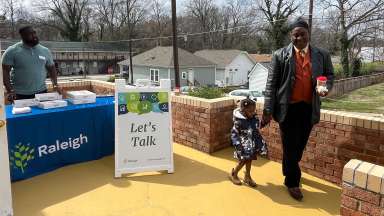City staff have been working toward an Alternative Response Program in Raleigh. This includes evaluating existing services and researching other programs both locally and across the country. The research showed four aspects are commonly included in an alternative response program:
- Crisis call diversion;
- Co-response;
- A community response team; and,
- Care navigation or case management.
What Could This Mean for Raleigh Residents?
Implement Crisis Call Diversion in the Emergency Communications Department
The Emergency Communications Center (ECC) provides 911 service. Staff proposed adding three contracted licensed clinicians to take mental health related calls. Clinicians would de-escalate a situation and connect the caller to resources. The initial proposal puts a person in ECC from 9 a.m. to 5 p.m. seven days a week.
Create a Peer Support Team in the Housing and Neighborhoods Department
Three full-time positions are proposed to follow up with community members within 48 hours of their initial call. These peer support specialists would provide a direct connection to resources, ensuring people get the care they need and want.
Continue Co-response via ACORNS in the Raleigh Police Department
This requires $800,000 to be allocated to ACORNS to replace ARPA funding.
Establish a Community Response Team in Partnership with Wake County and Other Partners
This team of social workers, paramedics and/or mental health clinicians would respond to non-violent calls for service. These are most often calls related to quality of life or behavioral health. As Wake County typically provides these services, staff recommends working with the county and other community partners to establish this team and provide service for the City.
Who Did We Hear from During this Process?
The community engagement for an Alternative Response program included 22 public events and 1,400+ online survey responses with representation across the city. A summary report of all community engagement efforts is now available online. Themes emerging from the engagement process were:
- Community centered program;
- Trained and compassionate;
- Transparent and accountable; and,
- Independent from Raleigh Police Department.
What Happens Next?
The recommendations shared above will be included in the FY 2025 budget, to be presented to Council on May 21. Community conversations around this topic will remain ongoing. The City will continue working with Wake County and other partners to establish the Community Response Team.
